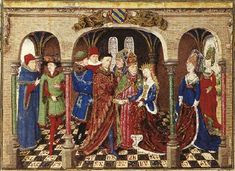It is not unusual to look back in history and perceive a "Golden Age" when life was better and people were more heroic. Charlemagne, because he united much of Western Europe, promoted a rebirth of learning and arts, and spread Christianity, is seen as the cornerstone on which the nation of France was built.
The Matter of France is written about in chansons de geste, or "song(s) of heroic deeds."
A French poet from the Champagne region, Bertrand de Bar-sur-Aube (late 12th - early 13th centuries) divided the matter of France into three cycles of chansons de geste at the start of a poem about a Count of Paris who was one of Charlemagne's grandsons:
At Saint-Denis, in the great abbey, we find it written (I don't doubt) in a book of noble lineage that there have been only three gestes in well-defended France (I think no-one will argue with me now). [...]
The lordliest is that of the kings of France. [...]
The next, it is right to say, was of Doon of the white beard, he of Mainz who had many lands. [...]
The third geste, which was much to be praised, was that of Garin de Monglane of the fierce countenance. [...]
Doon and Garin are not well-known to modern audiences, but Charlemagne turns up in every European history book. Their stories are different, but the heart of the Matter of France is Christianity (especially against Muslims, who are erroneously perceived as polytheistic) and feudal loyalty. The chansons were largely seen by the Middle Ages as reliable historical retellings.
The Matter of France evolved and spread to other countries. The Song of Roland became Orlando Furioso ("The Frenzy of Orlando") and Orlando Innamorato ("Roland in Love") in Italy in the early 1500s and late 1400s respectively. These works in turn influenced Edmund Spenser's Faerie Queene in England.
More to the point for England and Spenser was the Matter of Britain, which I'll talk about next time.



